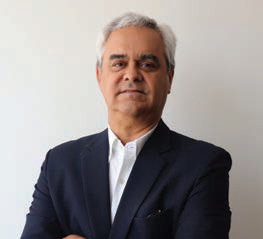Global recovery
16 July 2021In the second panel discussion of WBPI’s Beyond Covid Conference, we examine the pandemic’s impact on different world regions in the panel industry. Clive Pinnington, managing director of the European Panel Federation, moderated a panel including Andy O’Hare, president of the Composite Panel Federation; Pablo Figueroa Lopez, co-managing director, Finsa; and José Carlos da Fonseca Junior, executive director, IBA (Brazilian Tree Industry).
EPF managing director Clive Pinnington kicked off the second Beyond Covid panel discussion by summarising the impact of the Covid-19 pandemic on the European panels market.
“We know that in Europe the pandemic led to a very sharp crash but, thank goodness, a V-shaped recovery,” he said.
“We know that at the worst point, production dropped by 55% in furniture before recovering to an average of -7.4% for the year. It was a similar story in construction, with a drop of 25-30% before strengthening to -4.4% for the year.”
Andy O’Hare, president of the CPA, said the 2020 dip in North American composite panels shipments was very pronounced – 25-30% – in April and May of that year.
“However, those dips rebounded very quickly, so we went back to almost the same figures as 2019 by June,” said Mr O’Hare. “End of year shipments tracked closely to 2019.
“Shipments in Q1, 2021 have been off the charts, with particleboard up over 11%, MDF up almost 10%, so we project that our average shipment increase will be about 11% across North America in 2021, which is very reflective of the boom in our residential housing market.”
In South America, IBA executive director José Carlos da Fonseca Junior said the panels industry suffered an abrupt drop in H1 2020.
“We had to be very swift in conveying to the Brazilian government that what we did was an essential activity that should not be interrupted by the pandemic,” he said. “That paid off, so society realises more than before that what we do is important.”
After July of 2020, the V-shaped recovery has continued to this day.
Pablo Figueroa Lopez, co-managing director at Finsa, reported that after June, 2020 the importance of the home was elevated, helping the European furniture industry to recover very strongly.
“The housing market is booming and levels are going back to the end of 2019,” he said.
“We remain very strong today and seeing demand even stronger than the capacity to supply and we reckon that will last for a few months.”
Returning to South America, Mr Fonseca said the panels industry supplied mostly to the domestic market in Brazil, the majority in the furniture industry.
“We see some interesting changes in the behaviour of our consumers for furniture. Before the pandemic we were studying the trend of e-commerce compared to the traditional purchase of furniture in stores. The pandemic has accelerated those trends. As people worked from home, people had more time and more money to save on expenditures to their immediate surroundings.”
Mr Lopez agreed, citing a transfer from the leisure and tourism sector into the homes market. “At least part of this is going to stay but what percentage remains to be seen.”
Mr O’Hare agreed that it was unclear how much the spending boom on home furnishings would continue in 2021 and 2022.
North America, he said, was getting a taste of the millennials driving the market in the future, taking advantage of a growing build for rent market to get on the housing ladder.
“Once baby boomers move out of their homes it will have a resurgence in the remodelling sector, which rebounds to the composite panel industry, whether that’s millwork, furniture or cabinets. So for 2023 we are predicting a 6-7% increase of the remodelling market.”
He doesn’t expect the commercial sector malaise to recover quickly, but instead highlighted a permanent shift in the number of individuals going back to work in the commercial environment in the next five to six years, impacting leasing and building of commercial space.
Government policy was another focus topic highlighted by Mr Pinnington, with panel members describing government stimulus programmes across the world, putting money in people’s pockets and increasing consumer spending. Governments are also pushing the circular economy, construction with wood, and the decarbonisation of construction.
Mr Fonseca said the Brazilian federal government has a second stimulus project in operation to assist with companies retaining their employees.
Other discussion highlights included the importance of sustainability across the world and for wood’s role in delivering that.



